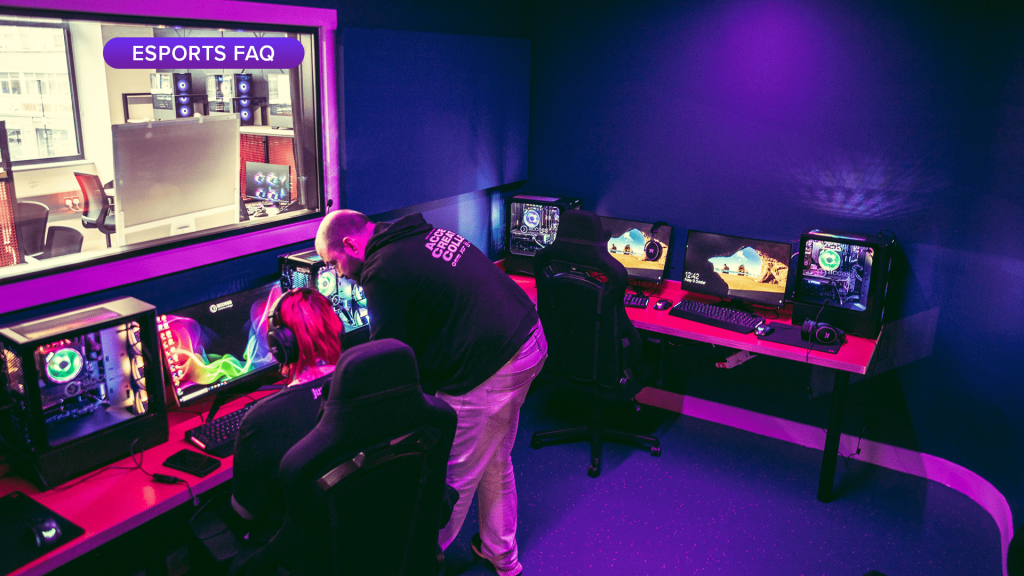
Trying to figure out what jobs in esports there are is an exciting, yet tasking, endeavour. What if somebody isn’t able to enter the industry as a player?
Luckily, there are dozens of positions and esports careers available that span various sectors such as teaching, marketing, event management, media and journalism. In this article, Esports Insider will showcase some of the jobs available in the esports industry to highlight the different types of careers available in the sector.
Although dividing the industry into a couple of categories is a difficult task, due to its scope and diversity, for the sake of this article roles have been divided into three separate categories: playing and coaching, content and broadcasting, and management and leadership careers in esports.
Players and coaching
Of course, just as in every sport, players and coaching staff are the ones that spend the most time under the spotlight, focusing on being an expert within a single game such as Dota 2, Counter-Strike, VALORANT among many others. Players of top-tier esports organisations train every day, just like their traditional sports counterparts, spending time off the stage in scrim (practice) matches with similar-ranking teams and players.
Players usually spend several hours every day playing the game itself, which is followed by game analysis, working with coaches and analysts to decide the next tactics and strategies, and similar work. Optimising health is also a huge factor within modern esports players, with most tier-one organisations now having specialised trainers to help players ease the strain of sitting down for long periods of time. Esports players in top leagues are also top earners, however, there are a wide range of salaries in esports, ranging from volunteer work to six-figure wages.
Surrounding players are coaching and performance staff. This includes roles such as performance analysts, scouts, mental coaches and personal trainers, who work with the players to streamline performances. The common perception is that coaches are typically retired players, still having a background as a player is not explicitly needed to coach an esports team.
As esports continues to evolve, many coaches have looked to hone their skills by gaining certifications or studying esports-relevant coaching qualifications. Some performance staff can also come from a variety of backgrounds, including professional sports and health industries.
Industry roles and education

Similar to traditional sports operations, every organisation needs leadership to steer it. In smaller organisations roles are usually more fluid, with people taking on several responsibilities across multiple divisions. However, for major organisations it is common to have just one person who heads up partnerships and sponsorships (Chief Commercial Officer), or another one handling the legalities of running a business in esports (Chief Legal Officer).
These higher-tier roles are becoming more needed as esports begins to professionalise even further. As a result, a lot of educational institutions are investing heavily in esports education. Moreover, esports fans are looking at college and university opportunities that could help fulfil the criteria of industry-focused roles.
For example, Access Creative College offers a range of skills in their Level 3 Esports Management Diploma, including coaching, event management and health and wellbeing, among others. This leaves the students with a well-balanced foundation to build on and steer into a certain direction, be that a leadership role or a role in broadcast or shout casting (commentating).
However, for the educational aspect to be optimum for students entering the esports sector, it needs to be thought out. Given that the sector is still in its infancy, most individuals who could be incredible teachers and lecturers are currently in the midst of their prime at esports organisations or companies. Staff need to also be very aware of trends in the industry to avoid the risk of educating students on now outdated operations.
This is why esports organisations regularly partner with educational institutions and provide real-world experience to those enrolled. This has proven to be a good approach, allowing to improve the quality of courses whilst also helping students with networking opportunities.
College graduates can also look towards internships at esports organisations that could land them roles in a particular segment of a company. Because internships provide real-world experience behind them, it is easier to fit into a work environment in the future.

Content and broadcast
As esports has become more mainstream and popular, there is a growing emphasis on developing the industry as an entertainment product. As a result, there are new roles and opportunities constantly popping up within the content creation and broadcasting sectors. With the rise of esports, production values have improved dramatically in recent years. Some of esports’ top-tier events are now on par, or even surpass, major leagues in traditional sports from a production standpoint. This calls for some serious production staff, with roles ranging from camera operators, producers, on-air talent and a diverse array of technicians.
Due to the fast-growing nature of esports, the broadcast segment is typically a great segment of the industry for students., Most technology and media-related university courses provide the basics of video production and there are a range of transferable skills that can be applied across different productions and broadcasts.
Alongside production roles, media and content make up an incredibly important segment of the industry. Besides landing jobs at content-focused companies, such as Esports Insider as a freelance journalist, there are dozens of creative roles in the media space. There are also a large variety of independent journalists and reporters that have branched out to create newsletters and blog content, without the backing of a media company.
It also doesn’t have to just be written content, with streaming and video roles arguably one of the pillars of the esports industry. This segment has grown exceptionally fast as organisations figure out new ways to monetise their audiences. This ranges from photo and video editing, social media roles that might be focused on specific platforms such as TikTok, or content creation for an esports brand or an organisation.
Interestingly, there are also a variety of jobs that whilst aren’t typically associated with content and broadcast, are incredibly integral to esports operations. These include roles like software developers, designers, supply chain managers, merchandise experts and so on.
Conclusion

The esports industry is a massively diverse environment, with new roles starting to rise in prominence every year. Whether it is setting up stages for big events to developing Web3 apps, if a passion for esports is found, then there is a way to enter the scene by utilising already established skills and experiences.
If you are interested in starting an esports career by enrolling at Access Creative College, feel free to explore the possibilities via their official website!
Supported by Access Creative College
